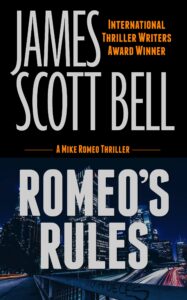I didn’t know anything about writer conferences until after I’d signed a contract for my first novel back in 2011. It never occurred to me that writers would gather somewhere to discuss the craft and maybe learn from others who’re successful at spinning stories for fun and profit. It should have, because in my previous life as a communications professional, I went to a lot of Public Relations conferences.
My first mystery conference was Sleuthfest, in Florida, and I only knew about it because I had to go there to meet my editor, Annette Rogers. She arrived bearing a ream of white paper in her arms and recognized me by the hat hanging from the back post of my chair.
My eyes widened when she thumped the thick stack of papers on the tabletop. The title page was red, with either paint, or a thick application of crayon. A huge question mark rose above the manuscript’s title.
The folded corners rose thick on the upper right side, with fewer on the lower right.
Good God! She’s graded the damned thing!
I checked the upper left-hand corner, but there was no accusatory grade of F there to mock and embarrass me.
Whew.
Annette shook my hand and positioned the papers in front of her. She broke into a smile. “We absolutely love this manuscript.”
Good, because I did, too. I’d hate to see what it looks like if you didn’t care for the stinkin’ thing.
“We’re going to publish, so we need to get busy on a few things.”
Those words were a symphony. “Sure.”
Green as grass, I laced my fingers to listen.
She flipped the title page out of the way and launched into a discussion of the plot and characters, referring to them as real people. No one had ever spoken about those figments of my imagination in such a way, and I was stunned to hear her discuss their fictionalized lives.
She even frowned when she noted that Miss Becky, one of the older protagonists in the multi-level cast of characters, had to do her wash on the front porch of an old farmhouse, because there was no running water inside.
I hung my head. I am ashamed I did that to her.
“Now, Rev, I’d like you to consider a few changes.”
Wait, what? Changes!!!??? I’d written a great novel. You said you loved it. Did people change Stephen King’s work? Did they ask David Morrell, who was sitting only two feet to my right to make Rambo a little tougher, or taller?
I swallowed. “What are those?”
She began with specifics about plot and characterization that came as thick and fast as a swarm of bees. Completely unprepared for an editorial meeting, I plucked an envelope from the inside pocket of my jacket and took a few notes on the back. By the time she’d reached page fifty, I had to unfold the piece of paper and write on the inside. Napkins came next.
We eventually reached the end of the manuscript and I wondered why she even bothered to tell me they were going to publish that piece of garbage.
But there was more to come. “Now, there’s a couple more things I need you to do.”
Good lord. More?
Wilted in my seat, I could barely raise my head. “What’s that?”
“Well, the word count is a hundred and forty thousand.”
140,000. Yep, that was about right. I wanted to produce a good, hefty book worthy of the aforementioned Stephen King.
She put down her pen. “I’d like you to pare it down by fifty thousand words.”
The number was staggering. 50,000! What she didn’t know, and I haven’t discussed here, is the fact that during the Pleistocene age, I finished The Rock Hole and hit save, only to see my computer screen go a nice shade of royal blue before two words appeared.
File Corrupted.
I didn’t know enough back then to save the work in another place back then, because I’d never heard that a 5½” floppy disk and my dinosaur program couldn’t hold several years of changes along with that much data. It was all gone, vanished in an electronic hiccup.
I re-wrote the entire manuscript from memory, so in essence she was asking me to delete 100,000 words.
I swallowed. What was I gonna say?
“Sure.”
“Great. A good mystery usually comes in at around ninety thousand words. Maybe ninety-five, but no more.”
“You want me to take out whole chapters?”
“No. I have a suggestion, and I’m sure you’ll find the right way to delete the rest. Try removing most of the attributes such as ‘He said,’ ‘She asked,’ ‘He exclaimed,’ and such as that. It slows the pacing for the reader. Give your character something to do instead like, ‘Ned crossed his legs,’ ‘Norma Faye tucked a strand of hair behind her ear,’ or even, ‘Cody lit a cigarette,’ since it’s set in 1964 and Cody smokes.”
She knew Cody that well already.
Hummm.
“I can do that. What else?”
Pleased, Annette took a sip of iced tea and gave me a bright smile. “I’d like you to re-write the ending.”
Worn to a frazzle, a raised eyebrow was all I could manage.
She picked up the pen and tapped it on the pages. “You killed everyone off at the end.”
“They were supposed to die.”
“Right, but if they’re all dead, we can’t continue as a series. This won’t be a standalone novel. I’m offering you a three-book contract.”
They’ll want two more of these to mark up?
I didn’t realize she’d just offered me the brass ring without having to ride the merry-go-round.
“Find a way to keep them going, and by the way, tighten up your writing. By writing tight, you can show us everything we need to know with as little fat as possible.”
I write fat?
“Remove the fat, and welcome to our publishing company.”
Yep, she said I write fat.
I went home at the end of that weekend and started to carve away everything Annette thought was wrong with the book. The Delete Button removed the vast majority the attributions and I fleshed the characters out with actions, giving them personality, habits, and worry lines.
However, the work swelled again, because “he said” takes a lot less space than a description such as the one below:
Cody plucked a pack of Chesterfield’s from his shirt pocket, lipped one out, and lit it with a gold Zippo. “We have to be careful, Ned.”
Ned speaks, but we have even more to read.
Ned rubbed his bald head in frustration and glared at Cody. “I’god. I’m always careful. You’re the one who goes off half-cocked.”
But what just happened!?
Lordy mercy, I soon learned that an incredible amount of information can be delivered in just a few words. Cody smokes. He has style when he lips one out. You can imagine him shaking one free without me telling you that part. He carries a Zippo. Cody is cool.
Ned is older. Bald. Frustrated by what is happening around them, and even by Cody himself. Does he not like him smoking? Is he frustrated with Cody’s spontaneous action? Is that going to lead to some kind of twist?
This was great!
As the conversation continues, the pacing takes over, as well as the character’s voice and I found that I’d streamlined the storyline, much like the way Elmore Leonard wrote lean, mean, sparkling conversations. The slow, fatty conversations in the first manuscript woke up with fresh dialogue that people actually use.
In the last chapters, I came into my own. Here in the Third Act, crusty Judge O.C. Rains questions his old friend, Constable Ned Parker, about what happened in the dark river bottoms only an hour earlier. Exhausted by what he’d experienced that night, Ned is half-carried into the house and placed in a rocking chair in front of the fire by Deputy John Washington, who retreats to the kitchen when Judge Rains arrives.
I’ve changed the antagonists name to avoid spoilers.
O.C. knelt beside Ned. He put a hand on his friend’s knee and leaned forward to whisper in the constable’s ear. “Ned, was it Jack for sure?”
Slumped in the rocker, Ned had little energy to answer. “Yes.
“Did you do for him?
“Yes.”
“Where is he?”
“With Cody.”
O.C. looked at his old friend for a long while, studying on what he might have done in the bottoms. “Is Cody all right?”
“Yes. I’m supposed to tell you something.”
“What?”
“Jack got away.”
O.C. thought for a moment about the conflicting answers, and then understood. “It’s over.”
“Yes.”
“But Jack’s gone.”
“That’s what I said.”
“This can’t come back.”
“It won’t.” Ned opened his eyes and they went flint hard. “Cody said. I believe him.”
“All right, then.”
“Something else.”
“What?”
“Cody weren’t there…because of what was done down on the creek.”
O.C. rose. “All right, then.”
What had taken up almost four pages in the original manuscript was distilled down into a tense, revealing conversation stripped down to speed up the pace, and cut words at the same time.
I edited with a vengeance.
The word count dropped but I needed to cut more words that took up space and nothing else. That’s when I remembered something Stephen King said in his book titled, On Writing.
“The road to hell is paved with adverbs.”
I was never a big fan of adverbs (still not), so away they went as I tightened up The Rock Hole even more. Within a month, the book was 90,000 words and ready for publication, all because those quick lessons from a master editor.
It was an education I could have used years earlier.

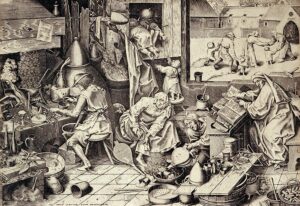
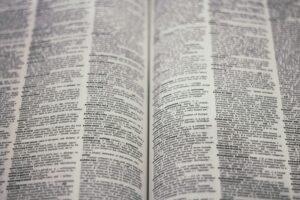


 You just landed a starring role in the remake of one of your favorite movies.
You just landed a starring role in the remake of one of your favorite movies. 


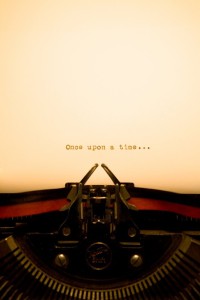

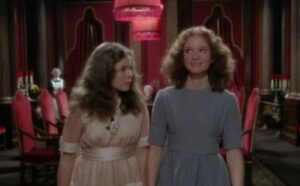
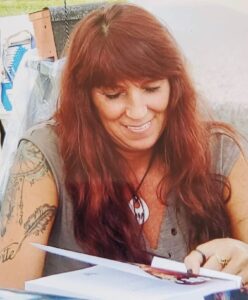
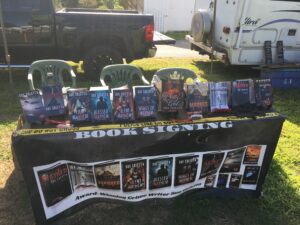 All book signings don’t need to be held in bookstores or libraries. I’ve had some of my most successful signings at local fairs and Old Home Days, and I’ve sold out and scored numerous book club invites.
All book signings don’t need to be held in bookstores or libraries. I’ve had some of my most successful signings at local fairs and Old Home Days, and I’ve sold out and scored numerous book club invites. Scenes are the bricks that build the fiction house. The better the bricks, the better the house. You don’t want bricks that easily crumble or aren’t fitted properly.
Scenes are the bricks that build the fiction house. The better the bricks, the better the house. You don’t want bricks that easily crumble or aren’t fitted properly.